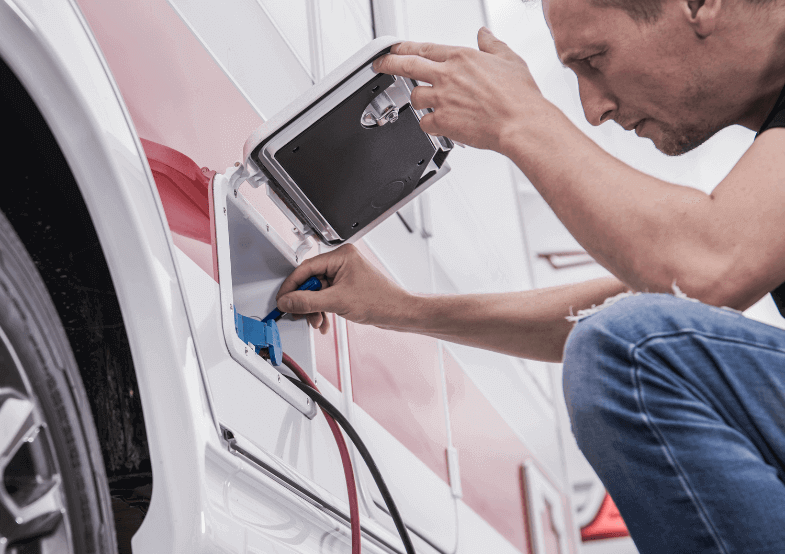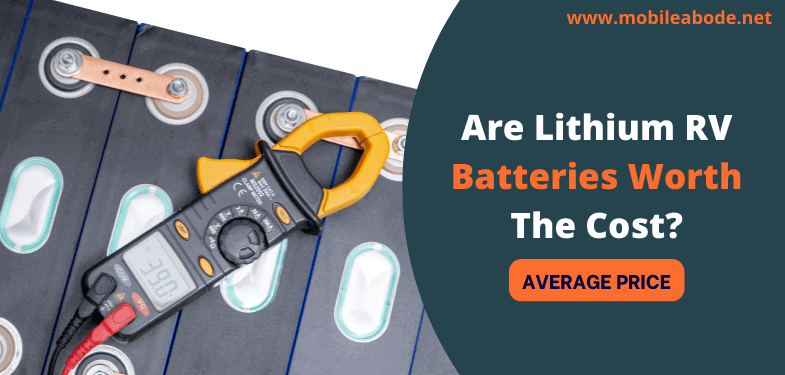Are RV lithium batteries worth it? This is a question that many people have, and the answer can vary depending on your needs.
In this post, we’ll look at some pros and cons of using lithium batteries in an RV, so you can decide if they’re right for you. Keep reading to learn more!
Are RV Lithium Batteries Worth It?
RV lithium batteries are a type of battery that is slowly becoming more popular in RVs. They are very similar to lead-acid batteries that have been used for years. They provide power to your RV when you are not connected to a power source like a campground’s electrical hookup.
They work by storing energy in chemical form and then releasing it as electricity when needed.
There are a few things to consider when thinking about whether or not RV lithium batteries are worth the investment.
First, you have to think about what you’ll be using them for. They might not be necessary if you’re just using them for occasional weekend trips. However, if you’re planning on living in your RV full-time or taking longer trips, then RV lithium batteries can make a big difference.
RV lithium batteries are more expensive than traditional lead-acid batteries but they have several advantages.
For one, they’re much lighter, so they won’t add as much weight to your RV. They also discharge slowly and evenly, so you’ll get more consistent power from them.
Pros of RV Lithium Batteries:
- They are lighter and more compact than lead-acid batteries.
- They have a higher energy density, meaning they can store more power in a smaller space.
- They have a longer lifespan than lead-acid batteries.
- They can be discharged and recharged more times than lead acid batteries.
- They work well in cold weather.
Pros of RV Lithium Batteries:
- They are more expensive than lead-acid batteries.
- They require a special charger.
- Some types of lithium batteries can catch fire if damaged or improperly used.
How much do RV lithium batteries cost?
RV lithium batteries typically range in price from $800 to $1,500. The exact cost will depend on the size and type of battery you need. You can generally expect to pay between $100 and $200 per kilowatt hour (kWh) of storage capacity. For example, a 100 kWh battery would cost between $10,000 and $20,000.
Some factors that will affect the price include the brand, the warranty, and the number of amp-hours (Ah) the battery can provide. The type of battery will also affect the price. Lithium-ion batteries are typically more expensive than lead-acid batteries, but they last longer and are more efficient.
When choosing an RV lithium battery, it is important to consider the cost as well as the features and benefits of the different types of batteries available.
How should buy RV lithium batteries?
There are a few things to consider when purchasing RV lithium batteries.
1) Size of the battery
The first is the size of the battery you need. RV lithium batteries come in a variety of sizes, so you’ll need to know what will fit in your RV.
2) Type of battery
There are two main types of RV lithium batteries: deep cycle and starter.
Deep cycle batteries are designed for long-term discharge, so they’re ideal for RVs that will be used for extended periods.
Starter batteries, on the other hand, are designed for short bursts of power and are better suited for RVs that will be used for shorter trips.
3) Cost of battery
The third is the cost of the battery. RV lithium batteries are more expensive than traditional lead-acid batteries, so you’ll need to factor that into your budget.
4) Availability
The fourth is availability. Not all battery dealers carry RV lithium batteries, so you may need to do some research to find a dealer in your area.
How to install RV lithium batteries?

There are a few things you need to take into consideration when installing RV lithium batteries.
- The first thing you need to do is measure the space where you will be installing the batteries.
- If you are installing a 12-volt system, you will need two batteries. If you are installing a 24-volt system, you will need four batteries.
- Next, you need to determine where you will be mounting the batteries. You need to make sure the batteries are mounted in a way that they will not move around while you are driving.
- Once you have determined where you will be mounting the batteries, you need to install the brackets that will hold the batteries in place.
- After the brackets are installed, you can now place the batteries in the brackets. Make sure the batteries are secure and will not move around.
- Now, you need to connect the batteries. You will need to use a battery cable to do this. The positive terminal of one battery needs to be connected to the negative terminal of the other battery.
- Once the batteries are connected, you need to connect the cables to the terminals on the batteries.
- You are now ready to use your RV lithium batteries.
FAQs – Lithium RV Batteries
How long do lithium-ion RV batteries last?
On average, a lithium-ion RV battery will last between 4 and 5 years. However, this is just an average and some batteries may last much longer while others may only last a couple of years.
Several factors can affect how long a lithium-ion battery will last, such as how often it is used, how it is stored, and how well it is maintained.
Can I replace my RV battery with a lithium battery?
Yes, you can replace your RV battery with a lithium-ion battery. However, you will need to make sure that your RV’s electrical system is compatible with lithium-ion batteries.
Lithium-ion batteries require a different type of charger than lead-acid batteries, so you’ll need to make sure that your RV has the necessary charging equipment.
You’ll also need to make sure that your RV’s battery box is large enough to accommodate a lithium-ion battery, as they are typically larger than lead-acid batteries.
Is a lithium battery better than a deep cycle battery?
Lithium batteries are often lauded as being better than deep-cycle batteries in many ways. For one, lithium batteries typically have a much longer lifespan than deep-cycle batteries.
Lithium batteries can also hold a charge for significantly longer than deep-cycle batteries, meaning that they can be used for extended periods without needing to be recharged.
Additionally, lithium batteries are typically much lighter than deep-cycle batteries, making them easier to transport and handle.
Will my RV alternator charge lithium batteries?
Lithium batteries are not compatible with most RV alternators. To charge a lithium battery, you would need a special charger that is designed specifically for lithium batteries.
If you try to charge a lithium battery with a standard RV alternator, it could damage the battery or the alternator.
Do you need a special charger for lithium RV batteries?
Yes, you need a special charger for lithium RV batteries. These batteries are not compatible with standard lead-acid chargers. Lithium RV batteries must be charged with a lithium-specific charger to avoid damaging the battery.
What is the best lithium battery for an RV?
There is no definitive answer to this question as it depends on some factors such as the desired battery life and the budget.
However, some of the best lithium batteries for RVs include the Battle Born 100Ah 12V LiFePO4 Battery, the Renogy 100ah 12v Deep Cycle Lithium Battery, and the WindyNation 100ah 12v Lithium Battery.
Wrap Up
Lithium RV batteries are a great choice for anyone looking for an upgrade over their traditional lead acid battery. They offer many benefits, such as quicker charging times. If you’re in the market for a new RV battery, be sure to consider lithium technology.
RV lithium batteries are an excellent investment because they have a longer lifespan and are less likely to experience problems like sulfation.

